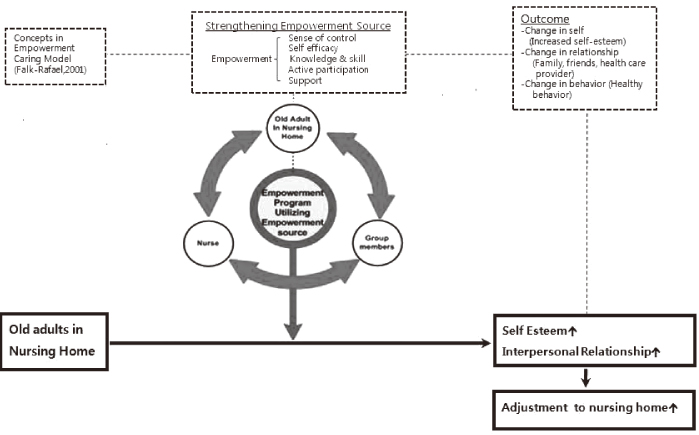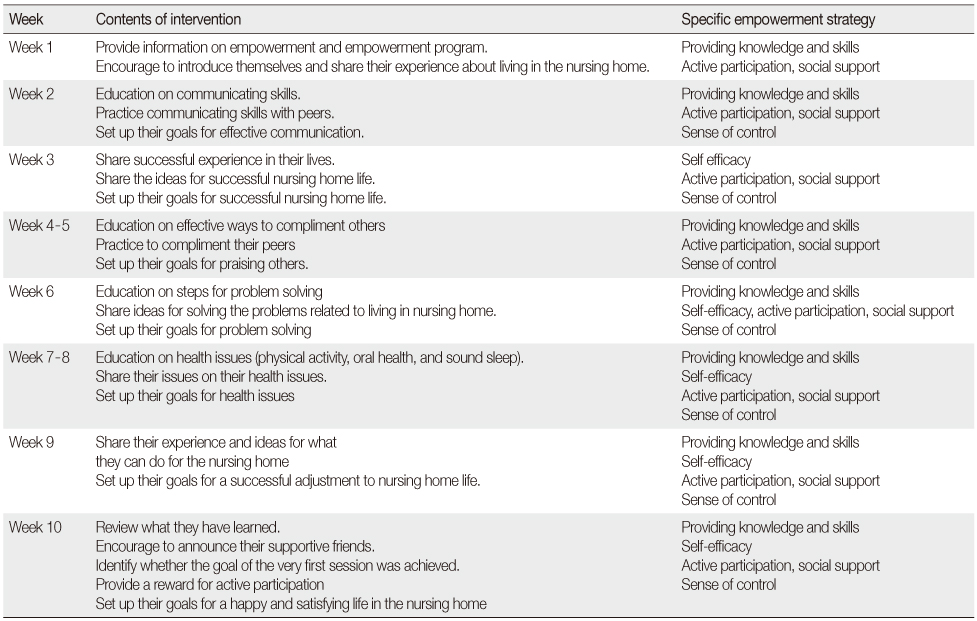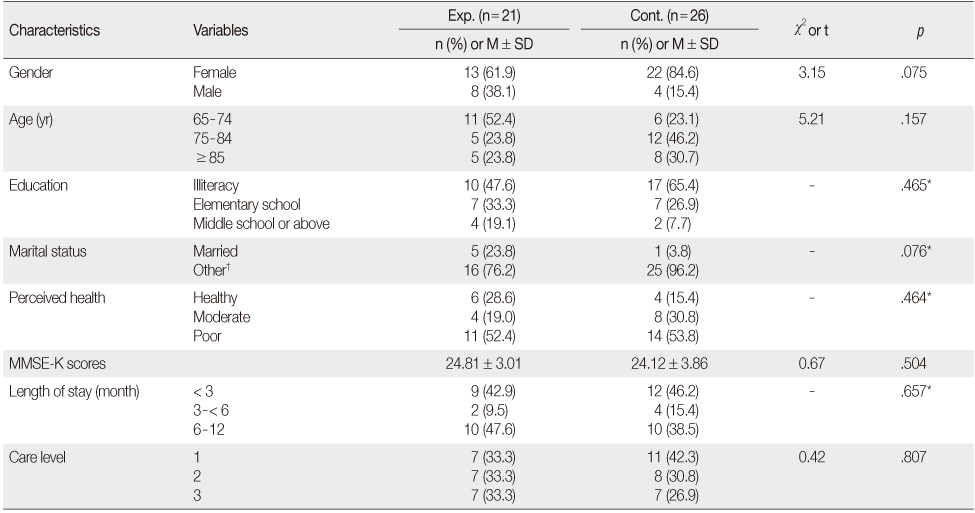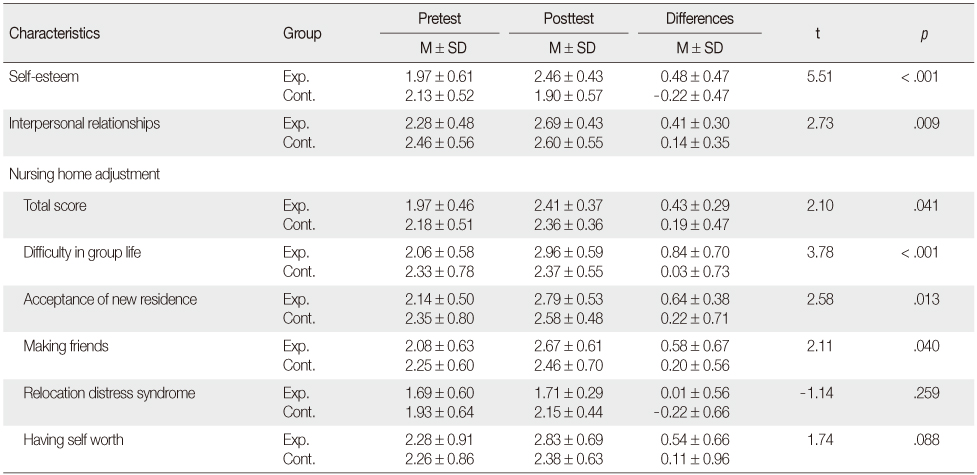Articles
- Page Path
- HOME > J Korean Acad Nurs > Volume 42(4); 2012 > Article
-
Original Article
- Effects of an Empowerment Program on the Adjustment of Older Adults to Nursing Home Life
- Aekyung Chang, Yeon-Hwan Park
-
Journal of Korean Academy of Nursing 2012;42(4):559-567.
DOI: https://doi.org/10.4040/jkan.2012.42.4.559
Published online: August 31, 2012
1College of Nursing, University of Illinois at Chicago, Chicago, U.S.A.
2College of Nursing, Research Institute of Nursing Science, Seoul National University, Seoul, Korea.
- Address reprint requests to: Park, Yeon-Hwan. College of Nursing, Research Institute of Nursing Science, Seoul National University, 28 Yeongeon-dong, Jongro-gu, Seoul 110-744, Korea. Tel: +82-2-740-8846, Fax: +82-2-745-8017, hanipyh@snu.ac.kr
© 2012 Korean Society of Nursing Science
- 1,041 Views
- 8 Download
- 7 Crossref
Abstract
-
Purpose
- This study aimed to evaluate the effectiveness of the empowerment intervention on the levels of self-esteem, interpersonal relationships and adjustment to nursing home life of the Korean nursing home residents.
-
Methods
- Participants (n=47) whose period of stay was less than one year were purposefully selected from 3 nursing homes in Korea. The experimental group (n=21) attended 10 weekly hour-long empowerment sessions. The empowerment program comprised two components; group education and group discussion. The control group (n=26) received a two-hour education about health management.
-
Results
- Compared with the control group, the experimental group showed significantly higher mean scores of self-esteem (t=5.51, p<.001), interpersonal relationships (t=2.73, p=.009) and adjustment to nursing home life (t=2.10, p=.041).
-
Conclusion
- Findings of this study suggest that empowerment interventions may be effective in enhancing nursing home residents' self-esteem, interpersonal relationships and adjustment to nursing home life. Future research is needed to determine if such an empowerment program could be used with newly institutionalized elders to speed as well as enhance their adjustment to nursing home life.
This article is based on a part of the first author's doctoral thesis from Seoul National University.
- 1. Bandura A. Self-efficacy: The exercise of control. 1997;New York, W. H. Freeman.
- 2. Boyce A, Wethington E, Moen P. Krout JA, Wethington E. Continuity and change in subjective well-being. In: Residential choices and experiences of older adults: Pathways to life quality. 2003;New York, Springer. 177–193.
- 3. Chang AK, Park YH. Sense of control, social support, depression, and adjustment of nursing home residents. Journal of Korean Academy of Adult Nursing. 2010;22(5):519–528.
- 4. Chang LC, Li I, Liu CH. A study of the empowerment process for cancer patients using Freire's dialogical interviewing. Journal of Nursing Research. 2004;12(1):41–50.Article
- 5. Chung SD. Predictors of self-esteem among older adults in nursing home. Journal of the Korea Gerontological Society. 2004;24(4):107–122.
- 6. Cohen J. Statistical power analysis for the behavioral sciences. 1988;2nd ed. New Jersey, Lawrence Erlbaum Associates.
- 7. Falk-Rafael A. Empowerment as a process of evolving consciousness: A model of empowered caring. Advances in Nursing Science. 2001;24(1):1–16.Article
- 8. Ha EH, Lee YW. Difference in self-esteem and quality of life according to perceived social support in institutionalized elderly people. Journal of Korean Gerontological Nursing. 2004;6(1):47–54.
- 9. Hammer RM. The lived experience of being at home. A phenomenological investigation. Journal of Gerontological Nursing. 1999;25(11):10–18.
- 10. Jirapaet V. Effects of an empowerment program on coping, quality of life, and the maternal role adaptation of Thai HIV-infected mothers. Journal of the Association of Nurses in AIDS Care. 2000;11(4):34–45. http://dx.doi.org/10.1016/S1055-3290(06)60394-4.Article
- 11. Kim M, Kim Y, Kim H. Study on the development and effectiveness of empowerment program for the persons with disabilities caused by industrial accidents. Korean Journal of Social Welfare. 2009;61(4):307–332.Article
- 12. Krout JA, Pillemer K. Krout JA, Wethington E. Lessons for providers and consumers. In: Residential choices and experiences of older adults: pathways to life quality. 2003;New York, Springer. 197–210.
- 13. Lee DTF, Woo J, Mackenzie AE. A review of older people's experiences with residential care placement. Journal of Advanced Nursing. 2002;37(1):19–27.ArticlePubMed
- 14. Lee GE. Scale development of free nursing home adjustment for the elderly. Journal of Korean Academy of Nursing. 2007;37(5):736–743.ArticlePubMedPDF
- 15. Lee GE. Predictors of adjustment to nursing home life of elderly residents: A cross-sectional survey. International Journal of Nursing Studies. 2010;47(8):957–964. http://dx.doi.org/10.1016/j.ijnurstu.2009.12.020.ArticlePubMed
- 16. Lee H, Lee HY, Lee J. Predictors of facility adaptation in nursing home residents. Journal of Korean Academy of Nursing. 2009;39(2):177–185.ArticlePubMed
- 17. Lewis K. How to foster self-determination. Practical ways nursing home staff can empower residents. Health Progress. 1995;76(8):42–44.PubMed
- 18. Melnyk BM, Alpert-Gillis L, Feinstein NF, Crean HF, Johnson J, Fairbanks E, et al. Creating opportunities for parent empowerment: Program effects on the mental health/coping outcomes ofcritically ill young children and their mothers. Pediatrics. 2004;113(6):e597–e607. http://dx.doi.org/10.1542/peds.113.6.e597.ArticlePubMedPDF
- 19. Moon S. A study on the effect of human relations training of university students. Journal of Gyeongsang National University. 1980;19:195–204.
- 20. Querimit DS, Conner LC. Empowerment psychotherapy with adolescent females of color. Journal of Clinical Psychology. 2003;59(11):1215–1224. http://dx.doi.org/10.1002/jclp.10212.ArticlePubMed
- 21. Ron P. Suicidal ideation and depression among institutionalized elderly: The influence of residency duration. Illness, Crisis & Loss. 2002;10(4):334–343. http://dx.doi.org/10.1177/105413702236513.ArticlePDF
- 22. Rosenberg M. Society and the adolescent self-image. 1965;Princeton, New Yok, Princeton University Press.
- 23. Rossen EK, Knafl KA. Older women's response to residential relocation: Description of transition styles. Qualitative Health Research. 2003;13(1):20–36.ArticlePubMedPDF
- 24. Schlein A, Guerney BG. Relationship enhancement. 1971;San Francisco, CA, Josey-Bass.
- 25. Shearer NB, Fleury J, Ward KA, O'Brien AM. Empowerment interventions for older adults. Western Journal of Nursing Research. 2012;34(1):24–51. http://dx.doi.org/10.1177/0193945910377887.ArticlePubMedPDF
- 26. Song AR. The effects of leisure activity program intervention on activities of daily living, depression and quality of life in institutionalized older population. 2001;Daejun, Chungnam University. Unpublished doctoral dissertation.
- 27. Tu Y, Wang R, Yeh S. Relationship between perceived empowerment care and quality of life among elderly residents within nursing homes in Taiwan: A questionnaire survey. International Journal of Nursing Studies. 2006;43(6):673–680. http://dx.doi.org/10.1016/j.ijnurstu.2005.10.003.ArticlePubMed
- 28. van Geen VM. The measure and discuss intervention: A procedure for client empowerment and quality control in residential care homes. Gerontologist. 1997;37(6):817–822.ArticlePubMed
- 29. Yang SJ. The effects of an empowerment program on empowerment, self-efficacy, and interpersonal relationships for persons with mental illness. 2009;Daegu, Catholic University of Daegu. Unpublished master's thesis.
- 30. Yoo MS. Effects of a multi-cultural marital advocacy program based on empowerment model on self-esteem, self-efficacy, coping way and family stress in multi-cultural couples. Journal of the Korean Society of Maternal and Child Health. 2010;14(2):145–160.Article
REFERENCES
Figure & Data
REFERENCES
Citations

- The effects of resourcefulness-based instrumental reminiscence therapy on psychological adjustment in nursing home residents: a randomised controlled trial
Xiaohui Pan, Qiyuan Huang, Zhefu Zhang, Huangqin Liu, Huimin Xiao
Age and Ageing.2024;[Epub] CrossRef - Empowerment of the older adults in the context of Chinese culture: an evolutionary concept analysis
Shibo Zhang, Junfeng Li, Jingjie Zou, Yating Ai, Siqi Qin, Xixi Xiao, Hui Hu, Yuncui Wang
Frontiers in Psychology.2023;[Epub] CrossRef - Integrated self‐management program effects on hemodialysis patients: A quasi‐experimental study
Ok Lae Park, Sung Reul Kim
Japan Journal of Nursing Science.2019; 16(4): 396. CrossRef - Comparisons of Health Promoting Behavior, Depression, and Life Satisfaction Between Older Adults in Rural Areas in South Korea Living in Group Homes and at Home
Sohyune R. SOK, Bo Kyeong CHEON, Min Kyung GU, Ok Sun KIM
Journal of Nursing Research.2019; 27(3): e21. CrossRef - Adaptation Process to Group Home Living by Older Adults
Hee Sook Yoon, Sohyune Sok
Journal of Korean Academy of Nursing.2016; 46(6): 858. CrossRef - How do levels of nursing home adjustment differ by length of stay?
Zhiyuan Yu, Ju Young Yoon, Bruce Grau
International Journal of Nursing Practice.2016; 22(5): 470. CrossRef - The Effects of a Program on Cancer Symptoms, Self-Efficacy, Self-esteem, and Empowerment in Home-based Cancer Patients
Jeong Sook Park, Yun Jung Oh
Journal of Korean Public Health Nursing.2013; 27(1): 50. CrossRef

Figure 1
Weekly Program of This Study
Homogeneity of Characteristics of General and related to Institutionalization
Exp.=Experimental group; Cont.=Control group; MMSE-K scores=Mini-mental state examination-K scores.
*Fisher's exact test; †Widowed/Divorced/Unmarried.
Homogeneity of Dependent Variables
Exp.=Experimental group; Cont.=Control group.
Comparison of Measurement Variables between the Experimental and Control Group
Exp.=Experimental group; Cont.=Control group.
Exp.=Experimental group; Cont.=Control group; MMSE-K scores=Mini-mental state examination-K scores. *Fisher's exact test; †Widowed/Divorced/Unmarried.
Exp.=Experimental group; Cont.=Control group.
Exp.=Experimental group; Cont.=Control group.
 KSNS
KSNS
 E-SUBMISSION
E-SUBMISSION





 Cite
Cite

